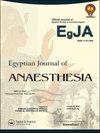非泵送冠状动脉搭桥术患者休克指数与术后预后的相关性(一项观察性研究)
IF 0.5
Q3 ANESTHESIOLOGY
引用次数: 0
摘要
本文章由计算机程序翻译,如有差异,请以英文原文为准。
Correlation between shock index and postoperative outcomes for patients undergoing on-pump coronary artery bypass graft surgery (an observational study)
ABSTRACT Introduction Shock index (SI) is defined as a ratio of heart rate and systolic blood pressure. It was originally employed to evaluate hemorrhage and acute circulatory failure. Recently, SI has been used as a morbidity and mortality predictor in various fields. An elevated SI was associated with higher morbidity. Objective To detect the sensitivity and specificity of SI in predicting major cardiac events. Methods We randomly enrolled 100 patients who were set to undergo on-pump coronary artery bypass graft (CABG) surgery in the study. The primary outcome was to detect the sensitivity and specificity of SI to predict the occurrence of major adverse cardiac events, occurrence of acute kidney injury (AKI) and the need for ventilator support for >48 h. The secondary outcome was to correlate between SI and need of inotropic support, length of hospital stay and in-hospital mortality. Results The main findings of our study were the presence of a good correlation between SI and occurrence of postoperative cardiovascular (CV) collapse, AKI and prolonged postoperative mechanical ventilation after on-pump CABG as primary outcomes as well as the presence of a significant correlation between the occurrence of in-hospital mortality and morbidities and high values of SI as secondary outcomes. Conclusions We believe that SI has a good prediction of postoperative CV collapse, AKI and prolonged postoperative mechanical ventilation >48 h.
求助全文
通过发布文献求助,成功后即可免费获取论文全文。
去求助
来源期刊

Egyptian Journal of Anaesthesia
Medicine-Anesthesiology and Pain Medicine
CiteScore
0.90
自引率
0.00%
发文量
78
 求助内容:
求助内容: 应助结果提醒方式:
应助结果提醒方式:


